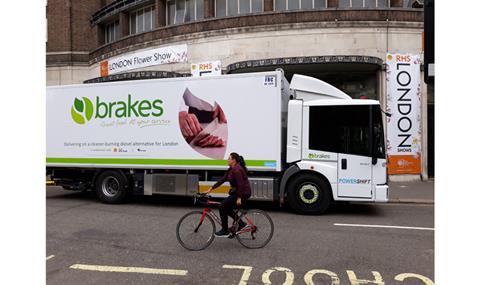
Brakes has put its first low-entry direct vision Mercedes-Benz Econic into operation in London.
The truck, pictured, is a response to London’s regulatory emphasis on cyclist safety and air quality. It runs on 100% Shell GTL (gas to liquid), a “paraffinic diesel” that is interchangeable with normal diesel but gives a better environmental performance.
Modifications are not normally required to the engine or fuelling infrastructure and the two fuels can be blended.
Shell has been working to build a market for its GTL, which is made in Qatar. This effort was boosted in 2016 with the adoption of a new standard, EN15940, which covers production from natural gas, biomass or vegetable oil. It said its GTL has a higher cetane content, starts better from cold, and is better on noise, NOx and particulate matter than diesel.
Brakes head of indirect goods and services procurement Steve Webster told MT the firm had conducted tests with GTL that found a significant NOx improvement over Euro-6 equivalents. The operator has been using the fuel for nine months, in its London-based Dafs.
“We’re still exploring [Shell GTL’s] benefits and the potential suitability to run it in other areas,” Webster said.
A maintenance benefit of the fuel is that Brakes “rarely has to regenerate the catalytic converters, which is a big benefit with an urban fleet”, he said.
The Econic is one of the first in the UK with Mercedes’ new PowerShift automated manual transmission, which delivers better mpg than was previously available, Webster added.
“We’ve only had the vehicle on the road for two weeks. The initial feedback from our drivers is that visibility appears much better, and it’s easier to access. It is early days on a trial of a single vehicle, so no decisions on our future direction have been made,” he said.
- In a statement Shell confirmed that fuel duty on GTL is the same as diesel, but it is pushing for a lower rate to encourage its use, citing Finland as an example.
By Jack Semple













